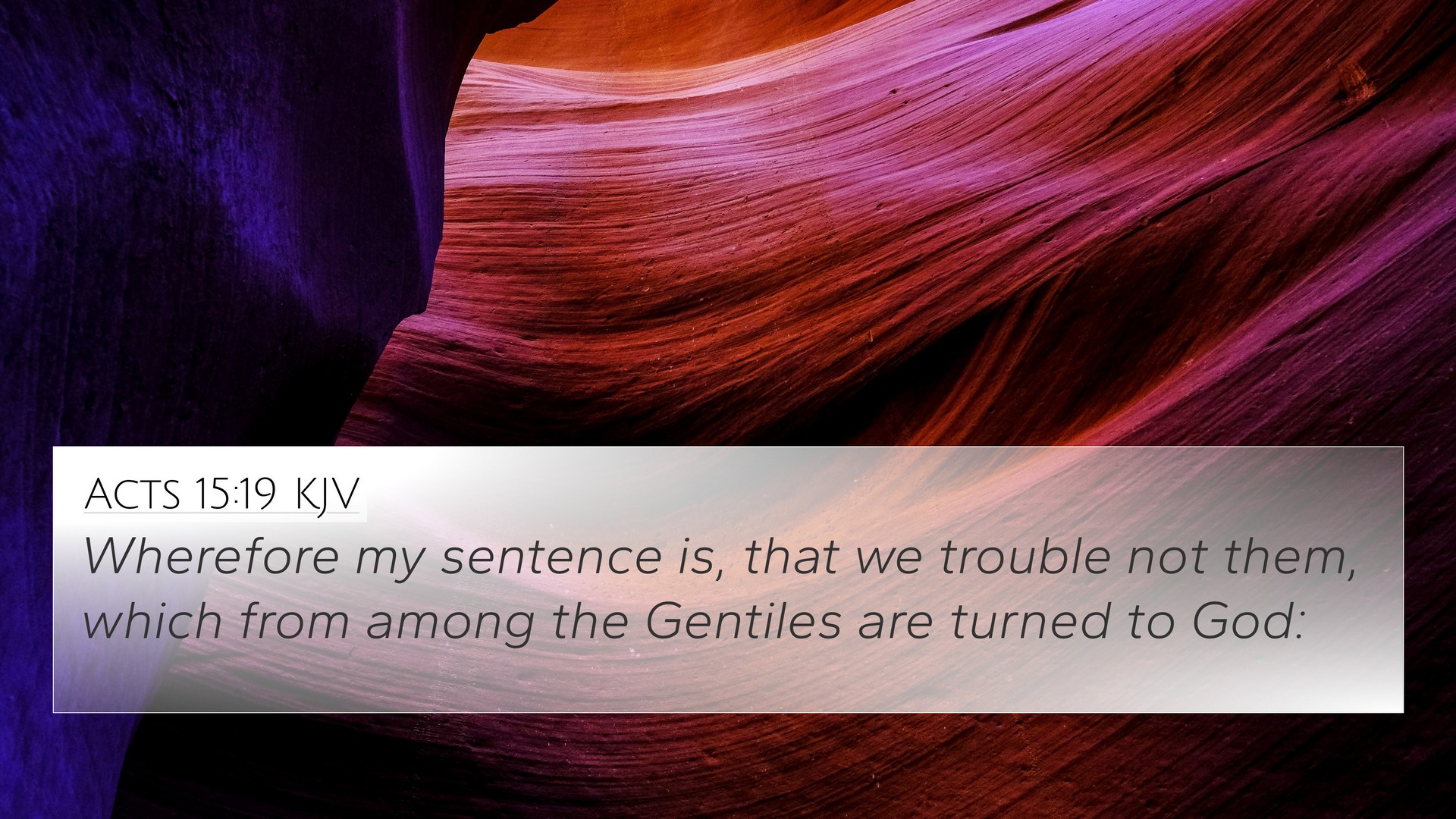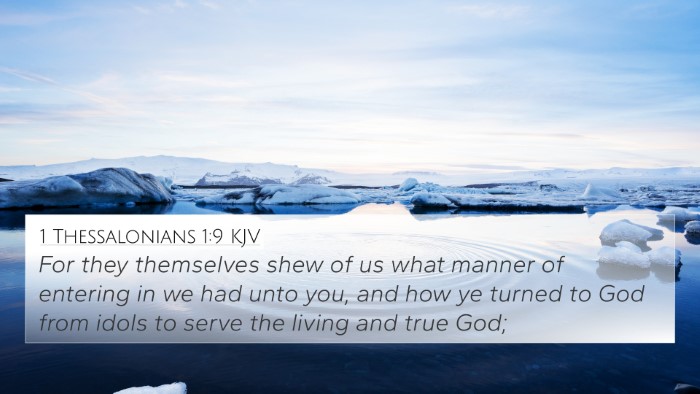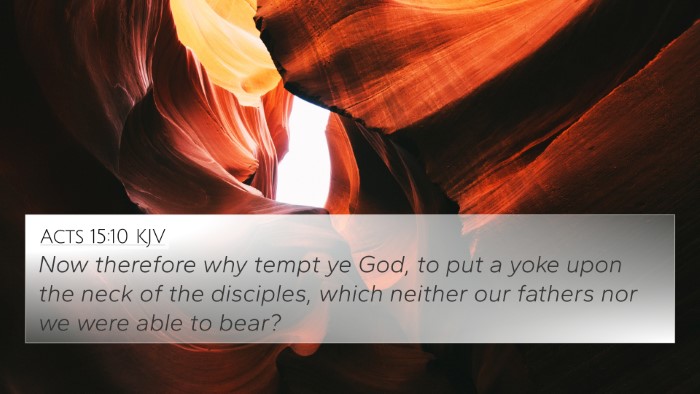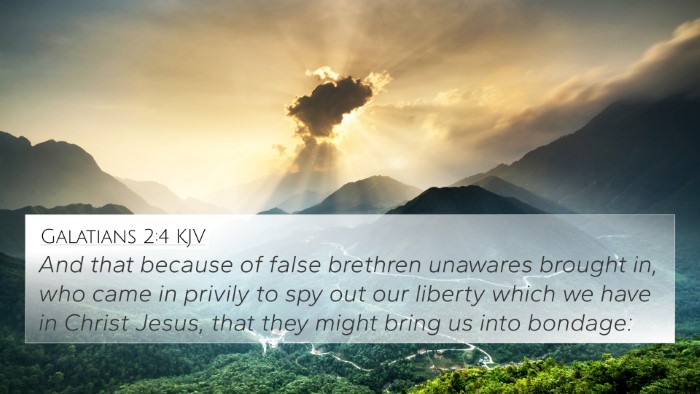Understanding Acts 15:19
Acts 15:19 states: "Therefore my judgment is that we should not trouble those of the Gentiles who turn to God." This verse emerges from the Jerusalem Council, where early Church leaders convened to determine how to treat Gentile believers in relation to Jewish laws and practices.
Context of Acts 15:19
The context of this verse is crucial for its understanding. As the early church grew, it became increasingly inclusive, welcoming Gentiles who were turning to God. This sparked debates over whether these new believers should adhere to the Mosaic Law, including circumcision and dietary restrictions. The apostles and elders gathered to deliberate on this significant issue.
Insights from Commentaries
-
Matthew Henry Commentary: Henry emphasizes the importance of not imposing unnecessary burdens on Gentile believers. He highlights God's grace and the spirit's role in guiding the church towards inclusiveness, which aligns with God's heart for all people.
-
Albert Barnes Notes on the Bible: Barnes interprets this verse as a decision made in a spirit of love and unity. He points out that the apostles recognized the need for simplicity in their message: acceptance into the faith should be based on grace rather than legalism.
-
Adam Clarke's Commentary: Clarke elaborates that this directive signifies a turning point, where the church acknowledges the distinct role of the Gentiles without requiring them to fully conform to Jewish customs, reaffirming the inclusiveness of the Christian faith.
Thematic Connections
Acts 15:19 connects with various themes in Scripture, including grace, inclusion, and the nature of faith. The verse clearly outlines the direction for the church, steering them away from legalistic practices and towards a more gracious approach to faith.
Cross-References
Below are several Bible verses that relate to Acts 15:19, showcasing the connections between various teachings within Scripture:
- Romans 3:28: "For we hold that one is justified by faith apart from works of the law." - This verse supports the idea of faith being the basis for salvation, not adherence to the law.
- Galatians 5:1: "For freedom Christ has set us free; stand firm therefore, and do not submit again to a yoke of slavery." - Highlighting the freedom from the law that Christians have through faith in Christ.
- Acts 10:28: "And he said to them, 'You yourselves know how unlawful it is for a Jew to associate with or to visit anyone of another nation, but God has shown me that I should not call any person common or unclean.'" - This verse signifies the breaking of barriers between Jews and Gentiles.
- 1 Corinthians 9:21: "To those outside the law I became as one outside the law (not being outside the law of God but under the law of Christ) that I might win those outside the law." - Paul speaks to his mission to reach Gentiles without the strictures of the law.
- Ephesians 2:8-9: "For by grace you have been saved through faith, and that not of yourselves: it is the gift of God, not of works, lest any man should boast." - Emphasizing salvation as a gift of grace.
- Acts 15:5: "But some believers who belonged to the party of the Pharisees rose up and said, 'It is necessary to circumcise them and to order them to keep the law of Moses.'" - This reflects the tension of the early church's decision-making process.
- Colossians 2:14: "By canceling the record of debt that stood against us with its legal demands. This he set aside, nailing it to the cross." - This verse shows the cancellation of the requirements of the law for believers.
- Matthew 11:28-30: "Come to me, all who labor and are heavy laden, and I will give you rest..." - This invitation highlights Jesus's message of grace over law.
- 2 Timothy 1:9: "Who saved us and called us to a holy calling, not because of our works but because of his own purpose and grace..." - Reinforcing the theme that believers are called through grace, not the law.
Application and Reflection
Acts 15:19 invites readers to reflect on their approach to faith and how they treat those who come to God from different backgrounds. It encourages an inclusive community that prioritizes spiritual grace over burdensome rules. Today, this verse encourages a church community that is welcoming and nurturing.
Conclusion
In summary, Acts 15:19 serves as a foundational principle for the Christian faith, emphasizing grace and inclusion for all who seek God. By understanding and cross-referencing this verse with related scriptures, believers can grasp the wider narrative of God’s redemptive plan and the early church's growth. The importance of this verse transcends its immediate context and resonates throughout the New Testament, guiding believers toward a deeper understanding of God's intention for unity and grace.
Tools for Cross-Referencing
To further explore the connections between Bible verses, consider utilizing various tools and resources:
- Comprehensive Bible cross-reference materials
- Bible concordance for locating related concepts
- Bible cross-reference guide for structured study
- Cross-reference Bible study methods for detailed analysis
- Identifying connections between Old and New Testament












